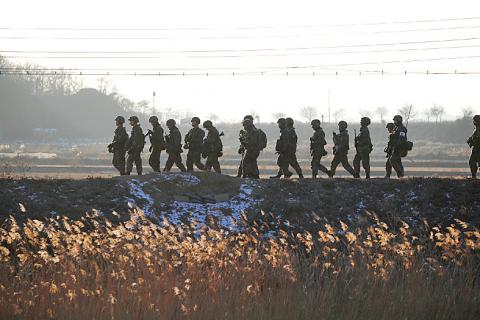North and South Korea yesterday reopened a cross-border hotline that had been shut down since 2016, forging ahead with peace overtures despite taunts from US President Donald Trump, who said he has a “much bigger” nuclear button than North Korean leader Kim Jong-un.
The hotline was restored after Seoul proposed high-level talks in response to an olive branch from Kim, who has offered to send a team to next month’s Winter Olympics in the South.
“The phone conversation lasted 20 minutes,” a South Korean Ministry of Unification official said, adding that details were not known immediately.

Photo: Reuters
Kim during his new year address included a warning to the US that he has a “nuclear button” on his table, prompting a furious response from Trump.
“North Korean Leader Kim Jong Un just stated that the ‘Nuclear Button is on his desk at all times.’ Will someone from his depleted and food starved regime please inform him that I too have a Nuclear Button, but it is a much bigger & more powerful one than his, and my Button works!” Trump said on Twitter.
The tweet generated responses largely of scorn and alarm.
“Our President is a child. ‘Mine is bigger than yours’ may sound tough on the playground, but this is no juvenile affair. Literally millions of lives are at stake,” former US national security adviser Colin Kahl said on Twitter.
However, US Ambassador to the UN Nikki Haley maintained a tough line, playing down Seoul’s offer to hold talks.
These would be a “Band-Aid” unless denuclearization was also up for discussion, she said.
US Department of State spokesman Heather Nauert also said that Kim “may be trying to drive a wedge of some sort between the two nations — between our nation and [South Korea].”
However, the tentative rapprochement seemed to be moving ahead yesterday, with Kim welcoming Seoul’s support for his overtures, said Ri Son-gwon, chairman of the South Korean Committee for the Peaceful Reunification of the Country.
The hotline in the border truce village of Panmunjom remained operational until February 2016, when it was shut down over a dispute involving the jointly operated and now closed Kaesong Industrial Complex.
Seoul welcomed Pyongyang’s decision to reopen the hotline as “very significant.”
Asan Institute for Policy Studies research fellow Go Myong-hyun said that North Korea was using the South as a “shield” as it tries to fend off sanctions and pressure from the US.
“If the South becomes the North’s dialogue partner, the US-South Korea alliance will face difficulties,” he said.

Seventy percent of middle and elementary schools now conduct English classes entirely in English, the Ministry of Education said, as it encourages schools nationwide to adopt this practice Minister of Education (MOE) Cheng Ying-yao (鄭英耀) is scheduled to present a report on the government’s bilingual education policy to the Legislative Yuan’s Education and Culture Committee today. The report would outline strategies aimed at expanding access to education, reducing regional disparities and improving talent cultivation. Implementation of bilingual education policies has varied across local governments, occasionally drawing public criticism. For example, some schools have required teachers of non-English subjects to pass English proficiency

‘FORM OF PROTEST’: The German Institute Taipei said it was ‘shocked’ to see Nazi symbolism used in connection with political aims as it condemned the incident Sung Chien-liang (宋建樑), who led efforts to recall Democratic Progressive Party (DPP) Legislator Lee Kun-cheng (李坤城), was released on bail of NT$80,000 yesterday amid an outcry over a Nazi armband he wore to questioning the night before. Sung arrived at the New Taipei City District Prosecutors’ Office for questioning in a recall petition forgery case on Tuesday night wearing a red armband bearing a swastika, carrying a copy of Adolf Hitler’s Mein Kampf and giving a Nazi salute. Sung left the building at 1:15am without the armband and apparently covering the book with a coat. This is a serious international scandal and Chinese

TRADE: The premier pledged safeguards on ‘Made in Taiwan’ labeling, anti-dumping measures and stricter export controls to strengthen its position in trade talks Products labeled “made in Taiwan” must be genuinely made in Taiwan, Premier Cho Jung-tai (卓榮泰) said yesterday, vowing to enforce strict safeguards against “origin laundering” and initiate anti-dumping investigations to prevent China dumping its products in Taiwan. Cho made the remarks in a discussion session with representatives from industries in Kaohsiung. In response to the US government’s recent announcement of “reciprocal” tariffs on its trading partners, President William Lai (賴清德) and Cho last week began a series of consultations with industry leaders nationwide to gather feedback and address concerns. Taiwanese and US officials held a videoconference on Friday evening to discuss the

PERSONAL DATA: The implicated KMT members allegedly compiled their petitions by copying names from party lists without the consent of the people concerned Judicial authorities searched six locations yesterday and questioned six people, including one elderly Chinese Nationalist Party (KMT) member and five KMT Youth League associates, about alleged signature forgery and fraud relating to their recall efforts against two Democratic Progressive Party (DPP) legislators. After launching a probe into alleged signature forgery and related fraud in the KMT’s recall effort, prosecutors received a number of complaints, including about one petition that had 1,748 signatures of voters whose family members said they had already passed away, and also voters who said they did not approve the use of their name, Taipei Deputy Chief Prosecutor